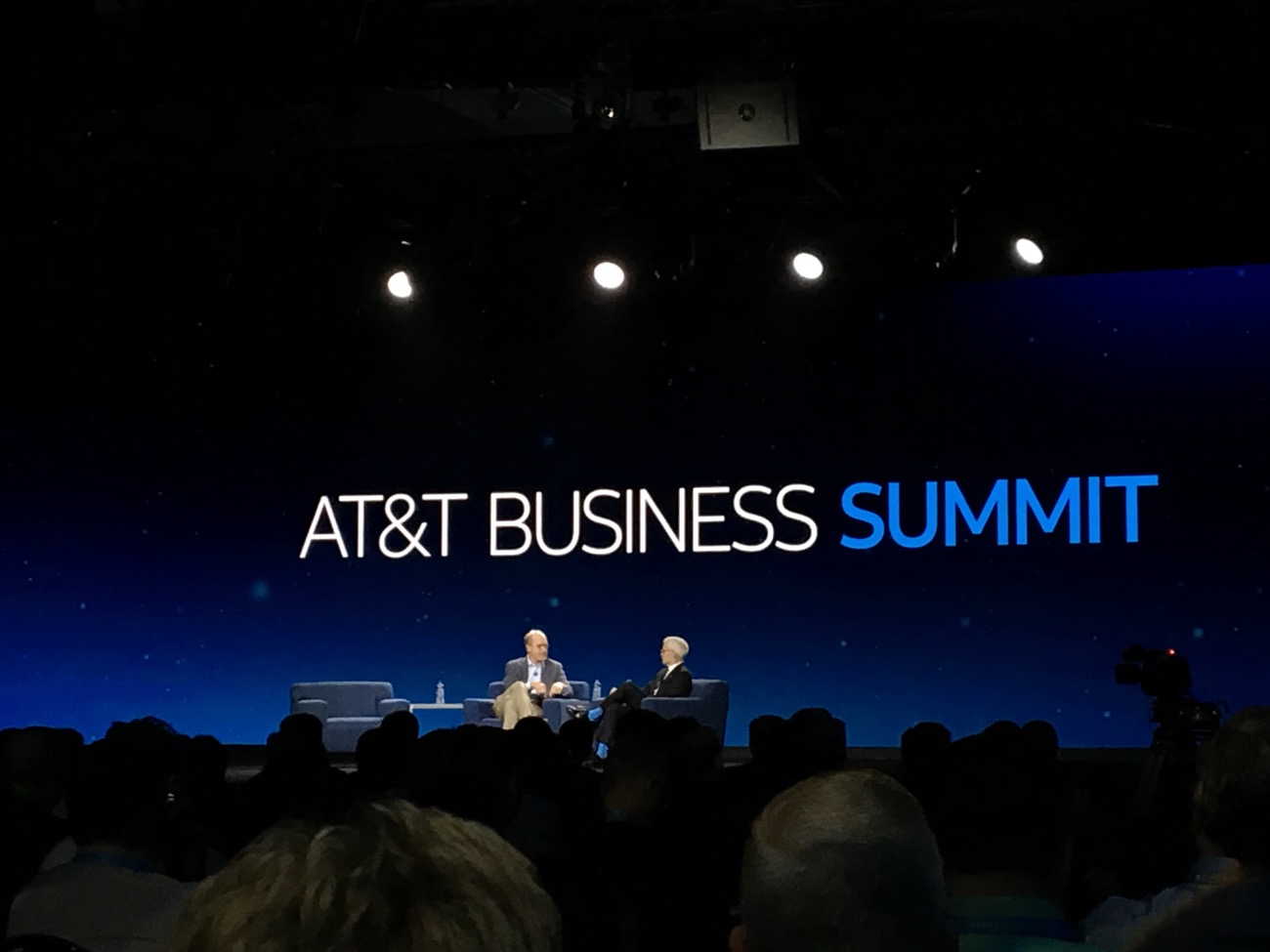 Photo by Danielle Abril
Photo by Danielle Abril
Heavy hitters explore the future of tech, media at AT&T Business Summit
By Danielle AbrilSeptember 28, 2018, 9:00 a.m.
AT&T spent two days outlining the expectations of a 5G network, highlighting the latest technology innovations, emphasizing diversity and inclusion in business, and providing a roadmap of the future after its blockbuster purchase of Time Warner Inc.
"Together we're transforming how business is done and shaping the global future," Thaddeus Arroyo, CEO of AT&T Business, told an audience of business customers at the opening presentation on Sept. 26. "We're all looking to better compete at a fast pace in an interconnected world."
The conversations were part of the the second annual AT&T Summit, an event the company hosts for thousands of its business customers across the world. This year, an estimated 3,000 people from 22 countries attended event held at the Gaylord Texan Resort in Grapevine.
The agenda included celebrity speakers and moderators including former British Prime Minister Tony Blair, CNN's Anderson Cooper, actress and founder Reese Witherspoon, singer/songwriter and entrepreneur Queen Latifah. It also featured power-player panelists including Deloitte's first female CEO Cathy Engelbert, author and journalist Malcolm Gladwell and Bozoma Saint John, chief marketing officer of entertainment giant Endeavor and former executive at Apple and Uber. It culminated with a private concert featuring Imagine Dragons and Gwen Stefani at AT&T Stadium in Arlington.
In an fireside chat with Anderson Cooper on Sept. 27, John Stankey, AT&T CEO of WarnerMedia, discussed the first 100 days after the Time Warner merger and offered insight to what's next.
"It's been mostly what I expected," he said. "That doesn’t suggest its been smooth sailing or easy."
Rather, the first 100 days has been about combing two pieces of an equation. On one side, AT&T provided the network. On the other side, Time Warner produced high-quality content, with brands like HBO, CNN and Warner Bros. under its umbrella.
And in a highly fragmented entertainment market, in which consumers have arguably too many options, AT&T will have to find a way to differentiate its offerings. But Stankey said the Time Warner acquisition is what will help it stay ahead.
"My gut tells me brand is going to be more important than less important," Stankey said. Brands will "offer a collection of experiences and ... its curated. ...You'll know what you're going to get" with each brand.
On top of that, while linear and streaming offerings are currently competing, they'll eventually combine as one, Stankey said. And that means models like Netflix could have a harder time competing, he suggested, as they currently operate without advertising. But having to produce massive amounts of original content and sustain to compete could change that.
Stankey said AT&T's software-defined network will also provide the company with an edge.
"The set top box is probably dead," he said. "It's not flexible enough to change with viewing habits. ... If formats change, if lengths of consumption change, devices change, you have the flexibility to change with that" on a software-based system.
With a 5G network rolling out, the offerings could be something totally outside of anything imagined. AT&T has already announced that it is bringing the high-speed network to 12 cities, including Waco and Dallas.
Once 5G is fully deployed, business in its entirety will change. Artificial intelligence and machine learning will be needed to aid with the massive amounts of data attached to the new capabilities.
The only thing that's certain is change. So companies and especially their workforces need to be prepared, Arroyo told Cooper.
"What we call the chief information officer is now the chief innovator," he said. "We're moving deeper into the heart of the fourth industrial evolution, and there's a lot of anxiety with that ... but the reality is the demand for the influx of human talent requires constant evolution to create those skills."
While evolution is necessary when it comes to the skill sets of the workforce, it's also needed in hiring, retention and employee support, according to various panelists throughout the two-day summit. That's because companies don't represent the communities they serve, both in their messaging and their makeup.
"You can look at ... companies with female leadership," Deloitte's Engelbert said. "Numerous studies that show that with companies with women leadership perform at the top quartile at a much greater rate than those without women leadership."
Inclusivity and diversity extend beyond gender and into race, ability, body types and numerous other factors—all of which should be taken into consideration by companies' leadership, panelists at the summit said.
Read more about what the future of 5G, artificial intelligence entails and more on diversity and inclusion in stories I wrote about the summit for The Dallas Morning News.
